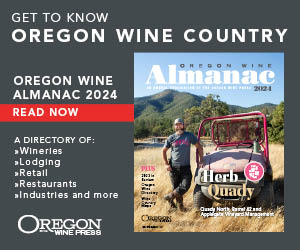“Mr. Pompadour” Passes On
By Gregory Jones
In April, the Rogue Valley and Oregon wine community lost one of its pioneers and staunchest supporters in Arnold Kohnert. Known affectionately as “Mr. Pompadour,” Kohnert’s signature statement could be heard on his answering machine: “This is Pompadour Vineyard, home of the best Bordeaux grapes in the Valley.”
Kohnert’s distinguished career stretched from the beaches of Normandy in WWII, to the profession of engineer, building commercial buildings in California, to Pompadour Vineyard, which he and his wife, Mary, tended for more than 20 years.
The Kohnerts bought their property northeast of Ashland in the mid-1970s, moving there in the early 1980s. They planted orchard fruits, a garden and, with the help of their son, Rodger—he grows grapes at Mary’s Peak Vineyard in the Willamette Valley—they planted nearly six acres of winegrapes in 1983. The plantings originally consisted of Cabernet Sauvignon, Cabernet Franc, Merlot, Malbec, Semillon and a small amount of Riesling and Nebbiolo.
Always aware of what did best at his site, Kohnert adjusted varieties and clones over the years, notably replacing the Riesling early on, replacing Malbec Clone 4 with Clone 9 for more consistent fruit quality, and even replacing his Semillon with Viognier over the last two vintages while in his late 80s.
Kohnert was helpful to everyone interested in growing winegrapes, including providing this writer with a tremendous amount of insight and information when I first came to the region, helping me better understand how to best serve the industry. He kept meticulous records of his vineyard and its climate and shared those with me over the years. Mary and his children continued this by providing information to share with the winegrape community regarding his experiences—Arnold would be proud of this.
Almost from day one, John Weisinger, of Weisinger’s of Ashland Winery, worked with Kohnert and his grapes. Weisinger wrote upon hearing of Kohnert’s passing, “To say that it has been a pleasure to work with Arnold is a gross understatement. He has mentored me, my son, Eric, and has been there to help our winery many times.”
In a note to Weisinger’s customers, many of whom tasted the fruits of Kohnert’s vineyard, Weisinger wrote “Around Weisinger’s, we will miss his firm handshake, the humorous stories, his consistent support and his undying belief that Southern Oregon is one of the greatest wine growing regions of the country.”
Eric Weisinger wrote to me from New Zealand, saying that, “Arnold’s enthusiasm for his vineyard was infectious, and I looked forward every year to working with him. The first time I blended the Petite Pompadour [all from Kohnert’s fruit] was the 1997 vintage. I remember tasting it with Arnold before its release and the sense of pride he seemed to have knowing that the fruits of his and Mary’s labor had become what was now in his glass.
“Arnold was my friend, a mentor, at times my critic and always my council. Most of all, he was part of my extended family. Our once-a-month lunches were a time for us to catch up. Never were they without wine, a little philosophy, humor and sage advice. Our last vintage together was in 2006, but the memories of Arnold and his stories will live through every new vintage… For that, I have a rich sense of gratitude and for Arnold, eternal respect.”
Randy Gold, longtime friend of the Kohnerts and an admitted wine “greenhorn,” visited Kohnert in 1984; Kohnert was “literally up to his elbows in apricots, which he was processing that day. But he took time out to expound on the virtues of Teleki 5C, his favorite rootstock.”
When Gold first considered planting Malbec, “a variety I knew little about,” in the early 1990s, he visited the Kohnerts to learn more. He warned Gold that it was a difficult variety to grow, and “he was right!
“We often joked in the following years about being the kings of Malbec in Oregon, as there was very little planted at the time,” noted Gold. “We also exchanged hints on how best to grow this finicky variety, and it only served to strengthen our connection.
“In the last few years of his life, Arnold and Mary decided to back off of some of the labor in the vineyard, and I was honored to be able to help them farm their place with the help of my crew. It took a season, but I think by the end, Arnold did trust me to do right by his babies.
“I will truly miss this pioneer of Southern Oregon viticulture.”
Gregory Jones is a professor and research climatologist in the Geography Department at Southern Oregon University; he specializes in the study of how climate variability and change impact natural ecosystems and agriculture.








